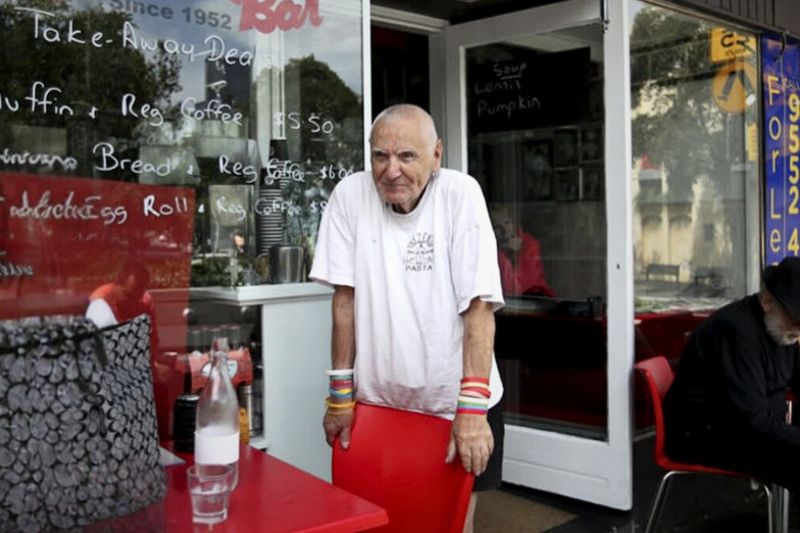I lived in Kings Cross between 2008 and 2017. And to live in the Cross meant that you knew Vittorio Bianchi. It was impossible not to know him. He started working at Piccolo Bar in Roslyn Street in the mid-’60s, bought the place in 1994, and never really left.

Well, he has left now. But that’s only because he died in March. And many would say that even though he has shuffled off this mortal coil, his infectious laughter and cutting asides will linger on as long as the building is standing. He’s as much a part of that place as the walls and ceiling.
You didn’t go to Piccolo Bar back in the day expecting fine cuisine. Or even a great coffee.
You went there for Vito. He was about as tall as Kylie Minogue, had an impish face and was as skinny as a scarecrow, but he was a giant of a man.
He would bitch and moan in the most entertaining way. He would dispense bon mots and tell stories about meeting Frank Hardy (‘He still owes me money. But I’ll never get it now because he’s dead. He was a socialist, you know’) and Peter Allen (‘He was very loud and very American considering he was Australian’) and Jeff Buckley (‘Oh, I adored him!’) and Marianne Faithfull and Red Hot Chili Peppers and Brett Whiteley…and, well, there are possibly famous people Vito didn’t meet, but they’re probably not worth talking about.
Back then I was writing regularly for the (sydney) magazine, a glossy mag that was inserted in The Sydney Morning Herald. Amongst the stories about glitzy restaurants and the beautiful and powerful people of the city, I wrote a monthly column called Street Life. In it, I would sit down with a Sydney character and ask them about their lives.
These were not famous people. They were more important than that. They were part of the fabric of the city, characters who Sydney-siders would see and say ‘I’ve always wondered what their story is.’ And I would wonder too.
I always wanted to write a Street Life about Vito. He pretended he didn’t want to be interviewed. But, of course, he did. So one wet Tuesday in 2009 I wandered in and he made me a (pretty average) coffee, then sat down at my table, let out a dramatic sigh and said, ‘Alright, what do you want to know?’
Unsurprisingly, he had a lot to say, about being an Italian immigrant and coming to Australia at the age of 14 knowing no English, about the bad old/good old days of the Cross, about being a gay Italian man at that time, about his hatred of gentrification and what it was doing to inner-city Sydney, about his adoration for the theatre and his admiration for actors and performers.
In many ways, Vito was a performer himself. He trained as an actor at the Ensemble theatre and would act as MC at a variety night called Cabaret Conspiracy.
In 2014, Kings Cross local Vashti Hughes wrote a play called Piccolo Tales and performed it in the café itself. It was a one-woman play, with Hughes playing Vito, but of course, he managed to edge his way into the action, acting the part of a heckler, a role he was born to play.
But his true calling was to be there in that café on Roslyn Street each day. The Piccolo was his stage, and he was the star.
His passing prompted an outpouring of stories from the many who knew him. It turned out that Vito had helped out people who were doing it tough, whether it was dipping into the till or lending a shoulder to cry on. He was a curious mix of cynical and sentimental, and was always ready with a quip, a cutting remark, a rant, a joke, or a reminiscence about the famous and not-so-famous.
He was 90 years old when he died, although The Sydney Morning Herald headline said he was 91. I can imagine him thundering from the great beyond in that scratchy voice of his: ‘F---ing journalists! They never bother checking the facts!’
He will be missed by family, by friends and by the countless locals who used to be regulars at Piccolo, or those who had only visited once and never forgot the little man who served them. Vito was that great thing – a Sydney character, who saw the Cross change around him, but managed to be part of the glue that held together a community that at its core was still a place for outsiders.
After my story about him came out in the magazine in 2009, every time I walked towards Piccolo, he would wave a tea towel in the air and call out: ‘Here comes the journalist! Barry Divola! When are you going to write another story about me?’
So, I guess I can answer him now. Here’s your next story, Vito. The Cross is poorer without you.
Vito’s niece has set up a GoFundMe page to cover funeral costs, a memorial at the Wayside Chapel, and a cabaret show – called Cabaret La Dolce Vittorio - Farewell to the True Queen of the Cross – that he requested take place in his memory.
Barry Divola is an author, musician and journalist who writes regularly for The Sydney Morning Herald and The Age. His latest book is the novel Driving Stevie Fracasso. Follow his writing at: authory.com/BarryDivola